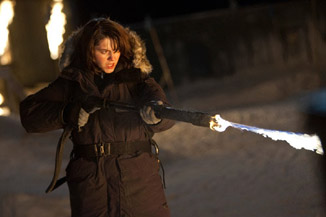Book vs. Movie: The Thing
By Russ Bickerstaff
October 19, 2011
In this corner: the Book. A collection of words that represent ideas when filtered through the lexical systems in a human brain. From clay tablets to bound collections of wood pulp to units of stored data, the book has been around in one format or another for some 3,800 years.
And in this corner: the Movie. A 112-year-old kid born in France to a guy named Lumiere and raised primarily in Hollywood by his uncle Charlie "the Tramp" Chaplin. This young upstart has quickly made a huge impact on society, rapidly becoming the most financially lucrative form of storytelling in the modern world.
Both square off in the ring again as Box Office Prophets presents another round of Book vs. Movie.
The Thing
John W. Campbell Jr. may not have the instant household name-recognition of sci-fi authors like Isaac Asimov, Ray Bradbury, Arthur C. Clarke or Robert A. Heinlein, but in genre circles he is respected as one of the founders of modern American sci-fi. The highly influential editor of Astounding Science Fiction and Unknown got his start writing short stories - the single most noteworthy being the 1938 novella Who Goes There?
The story of a group of scientists encountering a shape changing, hyper-adaptive alien life form in Antarctica became the subject of the 1951 RKO film The Thing From Another World, which was remade by John Carpenter over 30 years later. A little over three decades after that, Universal Pictures releases a prequel to that film. Campbell’s reputation may have been tarnished a bit by somewhat appalling publicly espoused opinions on smoking, slavery and L. Ron Hubard’s Dianetics, among other things, but his single most widely appreciated bit of fiction continues to capture imaginations. The question is, how does the original novella compare to the three films that have been based on it?
Who Goes There? (Astounding Science Fiction, August 1938)
Campbell’s work was the first to be referred to as “hard science fiction,” but that wasn’t until roughly a couple of decades after he wrote Who Goes There? That being said, the novella is kind of a sterling example of that kind of fiction. Campbell’s father was an electrical engineer - Campbell himself had been a student at MIT. This guy had a love of the technical and it really shows through in this story.
Continued:
1
2
3
4
5
6
7




